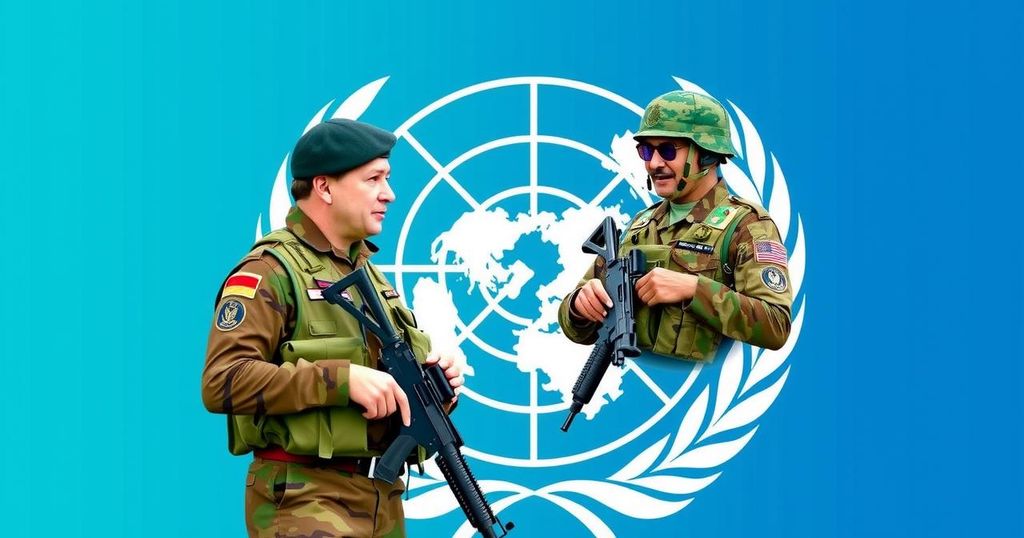Global news
AFRICA, CONFLICT RESOLUTION, DMITRY POLYANS, GEN, GENG, GENG SHUANG, HAITI, INTERNATIONAL RELATIONS, KENYA, MARIA ISABEL SALVADOR, MILITARY, NORTH AMERICA, PETIONVILLE, REGIONAL COOPERATION, U. N, U. N. SECURITY COUNCIL, U. N. TRUST FUND, U. S, UNITED NATIONS, UNITED STATES
Jamal Walker
0 Comments
Russia and China Reject U.S. Proposal for U.N. Peacekeeping Mission in Haiti
Russia and China have opposed a U.S.-led effort to convert the multinational force in Haiti, currently led by Kenya, into a U.N. peacekeeping mission. Gang violence has surged in Port-au-Prince, prompting discussions on support for the current multinational effort amid widespread funding shortages. Both nations highlighted that conditions do not permit a peacekeeping operation at this time. Leaders from Haiti continue to seek international assistance while raising concerns about the implications of previous missions.
On Wednesday, Russia and China stood against a U.S.-led initiative to convert the Kenya-led multinational force in Haiti into a United Nations peacekeeping mission. This opposition arose during a U.N. Security Council meeting amidst rising violence as gangs significantly escalated their assaults, impacting international transport and security within the capital, Port-au-Prince. The U.S. proposal for the peacekeeping mission emerged from a dire funding situation characterizing the multinational force, initially intended to deploy 2,500 international police. However, a mere fraction is currently operational.
Russian and Chinese representatives voiced their concerns, asserting that the environment in Haiti does not meet the criteria for peacekeeping operations. Both nations emphasized the need for support for the existing multinational force, indicating that any discussions about transitioning to a peacekeeping mission would be counterproductive amid ongoing violence. Despite the call for a U.N. mission, Haitian leaders also noted the importance of urgent aid for the multinational force to restore security effectively.
The conversation surrounding the necessary international intervention in Haiti reached a critical point. While U.S. Deputy Ambassador Dorothy Shea argued for the advantages of a U.N. peacekeeping mission, participants such as Kenyan national security adviser Monica Juma highlighted the importance of increasing support for the multinational force. Amid complex historical issues related to prior peacekeeping missions in Haiti, the dire security situation necessitates immediate action, as voiced by Haitian Dr. Bill Pape, who stressed the overwhelming challenges faced by both the local police and the multinational force.
The current situation in Haiti has intensified due to rampant gang violence, which has led to a significant control of the capital, Port-au-Prince, by criminal organizations. In early September, the United States proposed transitioning the multinational force, which relies heavily on voluntary contributions, into a U.N. peacekeeping operation to ensure stable funding amidst a funding crisis. However, this proposal has faced strong opposition from Russia and China, who argue that peacekeeping should not occur in environments without peace. The discussion highlights the complexity of international responses to the ongoing humanitarian and security crises in Haiti, exacerbated by economic and governance challenges.
In summary, the opposition from Russia and China to the transformation of the Kenya-led force in Haiti into a U.N. peacekeeping mission underscores the ongoing challenges Haiti faces in stabilizing its security situation. As the violence escalates, the urgency for meaningful assistance grows, with a consensus among some, including Haitian leaders, on the necessity for international support. However, the fundamental question of how to effectively deploy peacekeeping forces in a context of violence remains. Immediate and comprehensive support for the existing multinational force appears essential to address the critical needs of Haiti’s security landscape.
Original Source: www.usnews.com




Post Comment